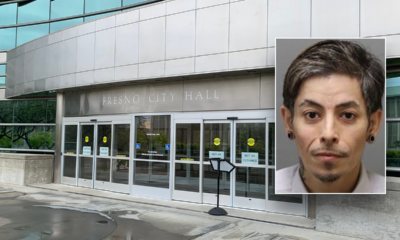Maryland men’s basketball has found itself in plenty of close games over the past few weeks. Four of its last five were decided by seven points or less, and the Terps won three of them.
Nebraska
Fischer Commends Nebraska Reservoirs Legislation at Senate Hearing

At a hearing today, U.S. Senator Deb Fischer (R-Neb.) pushed for her Swanson and Hugh Butler Reservoirs Conveyances Act, which would give Nebraskans more control over their communities by transferring reservoir land from the federal government to local counties. The hearing was held by the U.S. Senate Energy and Natural Resources Committee’s Water and Power Subcommittee. Yesterday, the U.S. House of Representatives Natural Resources Committee held a hearing on a companion bill introduced by U.S. Representative Adrian Smith (NE-03).
Senator Fischer and Representative Smith introduced this legislation at the request of Swanson and Red Willow residents and Hitchcock and Frontier County commissioners. If passed, the legislation will transfer the Bureau of Reclamation (BoR) Swanson Reservoir land to Hitchcock County and the BoR Red Willow Reservoir land to Frontier County. The Swanson and Hugh Butler Reservoir Conveyances Act is cosponsored by Senator Pete Ricketts (R-Neb.).
“Swanson and Red Willow residents want to enjoy local reservoirs and preserve local small businesses. But to keep doing that, they need control over their communities and the land around them. My bill will do that by transferring land from the federal government to Hitchcock and Frontier Counties. I look forward to working with my colleagues in the Senate and the House to pass this legislation,” said Senator Fischer.
“This bill is very important to residents of the Swanson and Red Willow reservoirs. Our delegation has acted quickly to find a solution that worked for the community, protected homes, and supported local businesses. This week’s hearings bring us one step closer to passage of this legislation in both the House and Senate,” said Senator Ricketts.
“This week’s hearings are a significant step forward after years of hard work by community members, Hitchcock and Frontier County leaders, and our delegation to find a solution for the reservoir communities. I am pleased to see this progress made to ensure the communities are not harmed by arbitrary bureaucratic decisions and local economies can thrive. I appreciate Sen. Fischer’s work to advance companion legislation in the Senate, and I will continue fighting for appropriate local control as the legislative process continues,” said Rep. Smith.

Click here to download audio
Click here to download video
Following is a transcript of Senator Fischer’s remarks as prepared for delivery:
Chairman Wyden, Ranking Member Risch:
Thank you for holding this hearing and including my legislation, S. 4347, the Swanson and Hugh Butler Reservoirs Land Conveyances Act on the agenda.
I’ve working alongside Hitchcock and Frontier County Commissioners, the concessionaires, impacted community members, and the Bureau of Reclamation on this legislation to allow 77.2 acres of land around the Swanson and Hugh Butler Reservoirs to be conveyed at fair market value to the counties.
Transferring this land to the local counties will chart a better path for the local community and the federal government.
This will allow community members to continue to enjoy the reservoirs and preserve numerous small businesses that operate in the area.
I’ve heard from over 1,000 constituents since I’ve introduced the legislation along with receiving numerous letters of support from local communities and businesses.
Action on this legislation is urgent, as the Bureau of Reclamation’s extended concession contracts expire in February of 2025 and some community members face being displaced due to the Bureau of Reclamation’s plan to end private exclusive use at the reservoirs.
Hitchcock and Frontier Counties are committed to ensuring continued public access to the reservoirs and providing effective management that is responsive to the local communities.
A number of the county commissioners, community members, and concessionaires traveled from Nebraska to be here today, a testament to the importance of getting this legislation signed into law and their commitment to providing effective management for the land.
I am also glad the entire Nebraska congressional delegation as well as members of Congress from Kansas, have joined me on this legislation and that just yesterday the House Natural Resources Committee also held a hearing on companion legislation.
I strongly support the full committee taking up and passing S. 4347, the Swanson and Hugh Butler Reservoir Conveyances Act, swiftly, and I look forward to working with my colleagues to get this legislation signed into law this year.

Nebraska
Athlete of the Week: Creighton Prep boys wrestling’s Zaiyahn Ornelas

OMAHA, Neb. (WOWT) – Creighton Prep senior Zaiyahn Ornelas won his fourth consecutive Nebraska state wrestling title on Saturday.
According to NSAA records, he joins 39 other wrestlers in state history to accomplish the feat.
“It’s a great feeling,” Ornelas said. “It’s a feeling everybody wants.”
Ornelas won three Class C state titles at Wilber-Clatonia at 106, 113 and 120 pounds before transferring to Creighton Prep for his senior season, where he competed in Class A at 126 pounds.
“Three state titles there and then just thought I could bump up my competition,” Ornelas said.
“Zaiyahn is one of the cleanest technicians I’ve ever seen. That’s a huge testament to his coaching staff at Wilber,” Fisher added.
Ornelas was one of four Creighton Prep wrestlers to win state titles this season, helping lead the Jr. Jays to the Class A team title. Teammates said his presence in the practice room raised their level of competition.
“I could never slack off just because my competition in the state was easy. I always had to come in this room and get better or else I was going to get beat,” said sophomore Cruzer Dominguez, a two-time Class A state champion at 106 and 120 pounds.
Sophomore Kameron Green, the Class A 144-pound state champion this year, also credited Ornelas for aiding in his development.
“Zaiyahn being a training partner has helped me in tremendous ways,” he said. “When he wrestles, he’s not the nicest or shyest kid, but he’s tenacious and tough.”
Junior JT Smith, a two-time state champion at 175 and 190 pounds, said the achievement carries weight for the entire team.
“It’s something really special to have a teammate that’s a four-time state champion,” he said. “That’s something everyone wants to be.”
Fisher said Ornelas’s attitude set the tone from the start.
“He has so many skills and then coming into our room, he’s extremely coachable. Every time he came in here he was humble, ready to work, wanting to get better and that’s why he is as good as he is,” Fisher said.
Ornelas signed to wrestle at the University of Nebraska in November. He said the move to Creighton Prep delivered what he was looking for.
“This is the reason why I came here. I went out to explore, to find the best, and this is the territory that I found. If it wasn’t for these guys — the push — I would have not been there,” Ornelas said.
“It’s hard to believe. That’s kind of what I wanted since the beginning, freshman year,” he said.
—
Watch breaking news unfold on our livestream. Download the First Alert 6 streaming app to your TV or find us in your favorite streaming platform.
Copyright 2026 WOWT. All rights reserved.
Nebraska
Nebraska Chamber taps former state senator to lead during leadership transition

LINCOLN, Neb. (KOLN) – The Nebraska Chamber of Commerce & Industry has selected a former state senator and longtime board member to lead the chamber while it searches for a new president and CEO.
Board of Directors Chair Pat Keenan said Thursday that Matt Williams of Gothenburg agreed to serve as interim president.
ALSO READ: Nebraska Chamber president and CEO resigns after less than a year
“The Board is grateful to Matt for stepping into this role during a very active and productive time for the Nebraska Chamber,” Keenan said. “He has steady leadership, strong relationships and trust from his many years of advocacy for economic development, and decades of experience working with the legislature and state government on tax policy and economic development incentives.”
Williams represented District 36 in the Nebraska Legislature from 2015 to 2023.
The chamber said Williams has had a lifelong career in banking and serves as chairman of Flatwater Bank. He previously served as chair of the Nebraska Bankers Association and the American Bankers Association.
His long involvement with the chamber includes membership on the Board of Directors; he currently serves as director for District 6. In 2025, he was named to the Nebraska Business Hall of Fame.
“The Nebraska Chamber is on rock-solid footing, with the clear vision of the Board, and talented and hard-working staff hitting its stride in legislative policy and advocacy, technology, manufacturing, leadership-development, fund-raising and membership. The success of cutting-edge initiatives like 6 Regions, One Nebraska, the launch of the Go Big Future series, and the strong member engagement across the state demonstrate the success and strength of this organization. I’m excited to lend my support in whatever way I can for the Chamber. I know how strong businesses and communities make for a stronger Nebraska, and I’m glad to be part of that.”
Click here to subscribe to our 10/11 NOW daily digest and breaking news alerts delivered straight to your email inbox.
Copyright 2026 KOLN. All rights reserved.
Nebraska
Maryland men’s basketball silenced late by No. 12 Nebraska, 74-61

Head coach Buzz Williams had ostensibly found a winning recipe in crunch time. That is, until Wednesday’s clash with No. 12 Nebraska.
Down by five with just over six minutes to play, the key ingredients for a comeback were nowhere to be found. Andre Mills, who had been superb over Maryland’s past few matches, turned the ball over to star forward Pryce Sandfort on an errant pass. Just seconds later, Sandfort splashed a 3-pointer, and Pinnacle Bank Arena went wild.
That sequence was the cap of a 9-0 run and the middle of an 0-of-4 shooting stretch for Maryland. What was largely a competitive contest soon became lopsided, and the Terps fell, 74-61.
Williams used his coach’s challenge just a minute and a half into Wednesday’s contest. The reversed call didn’t result in points right away — the Terps turned it over the very next possession — but it undoubtedly sent a crystal clear, no-nonsense message to the sideline.
And Maryland’s defense was ready for the rowdy away game occasion. The Terps notched just five points in the opening five minutes — two coming on a thunderous Solomon Washington slam — but didn’t allow Nebraska on the scoresheet. In fact, Maryland turned the Cornhuskers over twice in that span, and Guillermo Del Pino rejected a Jamarques Lawrence layup.
Nebraska started the game 0-of-6 from the field before finding the net. Sandfort channeled his shooting prowess, sinking a 3-pointer to give the Cornhuskers their first advantage of the match six-and-a-half minutes in.
Forward Braden Frager was the true catalyst for Nebraska’s sudden surge, logging seven of the team’s first 10 points and operating well in transition. His quick-hit offense didn’t allow Maryland to set up its effective half-court defense.
The Terps’ offense remained relatively cold as the midway point of the half approached. They embarked on a 1-of-8 shooting stretch, with Nebraska consistently switching on Maryland’s perimeter looks and forcing Washington into some perimeter shots.
Interestingly enough, it was Washington and his frontcourt counterpart — Elijah Saunders — that offered the team a surge from beyond the arc. The two combined for four of the squad’s first five 3-pointers — two of Saunders’ makes came in the last five minutes of the half to keep Maryland within striking distance.
The Cornhuskers took a six point advantage into the halftime locker room, up 33-27.
Rienk Mast finally got into a bit of rhythm to open the second half, burying a 3-pointer in an attempt to keep the Terps at bay. But Maryland’s offense wasn’t rattled. It didn’t revert to the same isolation playbook that it has sometimes found itself running; it instead was gritty on the glass and earned multiple second-chance opportunities.
Nebraska was being worn down on defense, and its crowd was becoming less intense. Maryland just needed to establish some prolonged momentum.
But the game remained deadlocked for the ensuing minutes. Andre Mills began to display some of the athletic lane-driving traits he’s exhibited over the past 10 contests. But he also drilled a pair of long-range jumpers, quickly becoming the team’s leading second-half scorer.
As the clock ticked below 10 minutes left with the game decided by just a matter of points, the Terps’ offense hit a stagnant stretch. Coit took four consecutive shots — and made only one — while the team’s ball movement came to a screeching halt.
After Nebraska’s 9-0 run, things didn’t realign on the attack for Maryland. Coit continued to struggle, going 2-of-6 from three in the second half. Mills also missed back-to-back looks, and from there, the result was all but decided.
1. Elijah Saunders’ big day. With Mills struggling in the first half Wednesday, Saunders picked up some of the slack. The 40% 3-point shooter made half of his looks, resulting in a season-high five 3-pointers against the Cornhuskers. That comes just one game after he set his previous season-high of four 3-pointers against Washington.
2. Paint production erased. Maryland’s frontcourt did some damage Wednesday night, but much of it came from deep. The Terps finished with just 14 points in the paint compared to Nebraska’s 26. Despite both teams grabbing seven offensive rebounds, Maryland didn’t make much of the second chance opportunities in the restricted area.
3. More Del Pino minutes. After playing 27 minutes and securing the win with an alley-oop lob against Washington, Del Pino was on the court for 15 minutes Wednesday. Though he finished without any points, he seems to have earned Williams’ trust and continues to operate the floor well from a distribution perspective.
-

 World1 day ago
World1 day agoExclusive: DeepSeek withholds latest AI model from US chipmakers including Nvidia, sources say
-

 Massachusetts2 days ago
Massachusetts2 days agoMother and daughter injured in Taunton house explosion
-

 Montana1 week ago
Montana1 week ago2026 MHSA Montana Wrestling State Championship Brackets And Results – FloWrestling
-

 Oklahoma1 week ago
Oklahoma1 week agoWildfires rage in Oklahoma as thousands urged to evacuate a small city
-

 Louisiana4 days ago
Louisiana4 days agoWildfire near Gum Swamp Road in Livingston Parish now under control; more than 200 acres burned
-

 Technology6 days ago
Technology6 days agoYouTube TV billing scam emails are hitting inboxes
-

 Denver, CO2 days ago
Denver, CO2 days ago10 acres charred, 5 injured in Thornton grass fire, evacuation orders lifted
-

 Technology6 days ago
Technology6 days agoStellantis is in a crisis of its own making



















